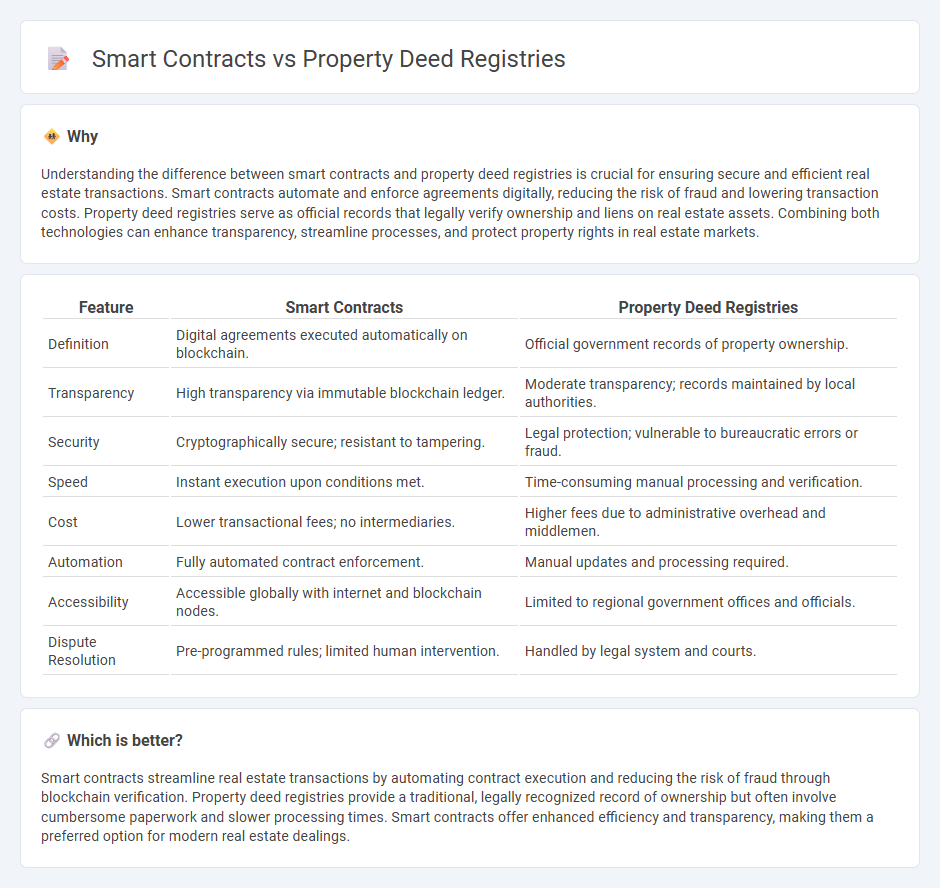
Smart contracts automate property transactions by securely recording terms on a blockchain, reducing fraud and increasing transparency compared to traditional property deed registries maintained by government offices. Blockchain technology ensures immutable records and faster processing times, transforming how real estate ownership is verified and transferred. Explore how smart contracts are revolutionizing real estate deed management and simplifying property transactions worldwide.
Why it is important
Understanding the difference between smart contracts and property deed registries is crucial for ensuring secure and efficient real estate transactions. Smart contracts automate and enforce agreements digitally, reducing the risk of fraud and lowering transaction costs. Property deed registries serve as official records that legally verify ownership and liens on real estate assets. Combining both technologies can enhance transparency, streamline processes, and protect property rights in real estate markets.
Comparison Table
| Feature | Smart Contracts | Property Deed Registries |
|---|---|---|
| Definition | Digital agreements executed automatically on blockchain. | Official government records of property ownership. |
| Transparency | High transparency via immutable blockchain ledger. | Moderate transparency; records maintained by local authorities. |
| Security | Cryptographically secure; resistant to tampering. | Legal protection; vulnerable to bureaucratic errors or fraud. |
| Speed | Instant execution upon conditions met. | Time-consuming manual processing and verification. |
| Cost | Lower transactional fees; no intermediaries. | Higher fees due to administrative overhead and middlemen. |
| Automation | Fully automated contract enforcement. | Manual updates and processing required. |
| Accessibility | Accessible globally with internet and blockchain nodes. | Limited to regional government offices and officials. |
| Dispute Resolution | Pre-programmed rules; limited human intervention. | Handled by legal system and courts. |
Which is better?
Smart contracts streamline real estate transactions by automating contract execution and reducing the risk of fraud through blockchain verification. Property deed registries provide a traditional, legally recognized record of ownership but often involve cumbersome paperwork and slower processing times. Smart contracts offer enhanced efficiency and transparency, making them a preferred option for modern real estate dealings.
Connection
Smart contracts automate the transfer of property ownership by securely recording transactions on blockchain-based property deed registries, ensuring transparency and reducing fraud. These decentralized registries eliminate the need for intermediaries, streamlining the verification process and accelerating property transfers. By integrating smart contracts with digital deed registries, real estate transactions become more efficient, trustworthy, and cost-effective.
Key Terms
Title Transfer
Property deed registries maintain official records of ownership transfers through government-managed, legally binding documents. Smart contracts automate title transfer processes using blockchain technology, ensuring transparency, immutability, and faster transaction settlements without intermediaries. Explore the evolving landscape of title transfer innovations to understand their impact on real estate transactions.
Immutable Records
Property deed registries traditionally rely on centralized authorities to maintain immutable records, ensuring legal proof of ownership and transaction history. Smart contracts leverage blockchain technology to create tamper-proof, decentralized records that automatically enforce contract terms without intermediaries. Explore how these systems enhance transparency and security in property transactions.
Automation
Property deed registries traditionally rely on manual processes involving physical paperwork and centralized authority verification, which can be time-consuming and prone to errors. Smart contracts automate property transactions by executing predefined conditions on blockchain networks, enhancing transparency, reducing delays, and minimizing fraud risk. Discover how automation in property management through smart contracts is transforming real estate operations.
Source and External Links
Register of Deeds - NCpedia - The office of register of deeds maintains records of real property, ensuring legal notice and evidence of property ownership transfers in North Carolina counties, with records including deeds, mortgages, leases, and easements.
Land Records - North Carolina Secretary of State's Office - Land records, including deeds which define ownership and boundaries, are filed at the county Register of Deeds or Clerk of Superior Court offices, and may be accessed in person or online depending on the county.
Register of Deeds | Wake County Government - The Register of Deeds Office manages and safeguards public records such as deeds, deeds of trust, and plats, governed by state statutes, and also issues vital records like marriage licenses in Wake County.
 dowidth.com
dowidth.com